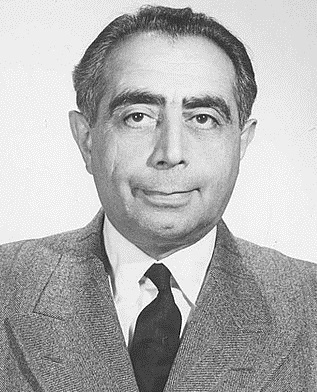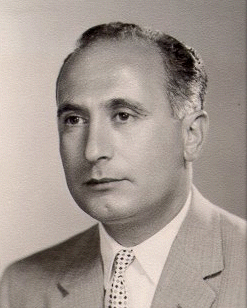
Mohammad Mosaddegh was an Iranian politician, author, and lawyer who served as the 30th Prime Minister of Iran from 1951 to 1953, elected by the 16th Majlis. He was a member of the Iranian parliament from 1923, and served through a contentious 1952 election into the 17th Iranian Majlis, until his government was overthrown in the 1953 Iran coup aided by the intelligence agencies of the United Kingdom (MI6) and the United States (CIA), led by Kermit Roosevelt Jr. His National Front was suppressed from the 1954 election.

Annemarie Schimmel SI HI TÇLN was an influential German Orientalist and scholar who wrote extensively on Islam, especially Sufism. She was a professor at Harvard University from 1967 to 1992.

The Qajar dynasty was an Iranian royal dynasty founded by Mohammad Khan of the Qoyunlu clan of the Turkoman Qajar tribe.

The Bakhtiari are a Lur tribe from Iran. They speak the Bakhtiari dialect of the Luri language.

Ali Amini was an Iranian politician who was the Prime Minister of Iran from 1961 to 1962. He held several cabinet portfolios during the 1950s, and served as a member of parliament between 1947 and 1949.

Richard Nelson Frye was an American scholar of Iranian and Central Asian studies, and Aga Khan Professor Emeritus of Iranian Studies at Harvard University. His professional areas of interest were Iranian philology and the history of Iran and Central Asia before 1000 CE.

Ehsan Yarshater was an Iranian historian and linguist who specialized in Iranology. He was the founder and director of the Center for Iranian Studies, and Hagop Kevorkian Professor Emeritus of Iranian Studies at Columbia University.
The National Front of Iran is an opposition political organization in Iran. It was founded by Mohammad Mosaddegh in 1949, and it is the oldest and arguably the largest pro-democracy group operating inside Iran, despite having never been able to recover the prominence it had in the early 1950s.
Nora Elisabeth Mary Boyce was a British scholar of Iranian languages and an authority on Zoroastrianism. She was Professor of Iranian Studies at the School of Oriental and African Studies (SOAS) of the University of London. The Royal Asiatic Society's annual Boyce Prize for outstanding contributions to the study of religion is named after her.
Shirin Akiner was a scholar of Central Asia and Belarus. She was a research associate at London University's School of Oriental and African Studies (SOAS).
George Michael Wickens was a distinguished Canadian-British Persianist as well as Arabist, translator and a University lecturer.

Vladimir Fyodorovich Minorsky was a White Russian academic, historian, and scholar of Oriental studies, best known for his contributions to the study of history of Iran and the Iranian peoples such as Persians, Lurs, and Kurds in addition to the Kartvelian Laz people.
Shaykh Ali Khan Zanganeh, was an Iranian statesman of Kurdish origin, who served as the grand vizier of the Safavid king (shah) Suleiman I from 1669 to 1689. Due to his efforts in reforming the declining Iranian economy, he has been called the "Safavid Amir Kabir" in modern historiography.

Elena Efimovna Kuz'mina was a Russian archaeologist. She was the chief research officer of the Russian Institute for Cultural Researches. She led 25 archaeological expeditions and participated in over a hundred, mostly in the Eurasian steppe region.

Abbas Amanat is an Iranian-born American historian, scholar, author, editor, and university professor. He serves as the William Graham Sumner Professor of History at Yale University and Director of the Yale Program in Iranian Studies.
Sir John Francis Fortescue Horner, was a British barrister. His family had lived at Mells Manor for generations and many have memorials in St Andrew's Church, Mells. He and his family became associated with The Souls, a social group which included many of the most distinguished English politicians and intellectuals of the Victorian era.

Seyyed Mohammad Ali Keshavarz Sadr was a lawyer, judge, author and leading figure in the National Front of Iran. A close friend and associate of Prime Minister Mohammad Mosaddegh, often acting as his official deputy, he nationalised the Iranian fishing industry and played a major role in the nationalization of the Iranian oil industry. He served as governor of Isfahan, Gilan and Tehran. He entered parliament as representative of Khorramabad. After resisting the 1953 Iranian coup d'état which toppled the democratically elected government of Mossadegh, Keshavarz Sadr was imprisoned and tortured. After his release he became spokesperson of the Second National Front and wrote a range of books.
Ali Gheissari is an Iranian historian and sociologist. He is research associate of history at the University of San Diego and has research interest in the intellectual history of modern Iran and in modern philosophy and social theory. He has been visiting professor of religious studies at Brown University, Iranian Studies at St. Antony's College, Oxford, and History of Modern Iran at the University of California, Irvine. He is known for his works on the intellectual history and politics of modern Iran. He is on the Editorial Board of Iran Studies book series published by Brill, and has served as the Editor-in-Chief of the journal Iranian Studies.
Philip G. Kreyenbroek is a Dutch academic specialising in Iranian studies. Throughout his career, he has published several books and articles on the Zoroastrian, Kurdish, and Yazidi traditions.











